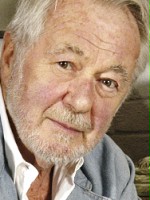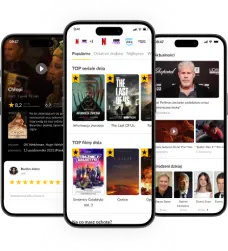powrót do forum osoby Bryan Forbes
Forbes was born John Theobald Clarke on 22 July 1926 in Stratford, London. From an early age he had set his heart on an acting career and he entered the Royal Academy of Dramatic Arts when he was seventeen, but didn't complete his studies. During the war he served in the Intelligence Corps and later the Combined Forces Entertainment Unit. Changing his professional name to Bryan Forbes, he made his screen-acting debut in 1948 and over the next decade became a familiar and dependable supporting player in a number of notable British films, including The Small Back Room (d. Michael Powell, 1949), An Inspector Calls (d. Guy Hamilton, 1954) and The Colditz Story (d. Hamilton, 1955).
However, acting began to take second place to screenwriting and then directing. He made significant contributions to the scripts of exciting war dramas such as Cockleshell Heroes (d. José Ferrer, 1955) and I Was Monty's Double (d. John Guillermin, 1958), before receiving great acclaim for his screenplay for Basil Dearden's The League of Gentlemen (1959), in which a group of ex-servicemen on the social scrap heap revive their former skills to plan a daring robbery. The film's cynical tone was memorably encapsulated by Forbes in an exchange between Nigel Patrick and Jack Hawkins where the former notices a prominent oil painting of the latter's wife and gently enquires if she is now dead. "No," replies Hawkins, suavely, "I'm sorry to say the bitch is still going strong."
A similar astringency enlivens his script for Sidney Gilliat's frisky version of a Kingsley Amis novel about thwarted adultery, Only Two Can Play (1962). "Still peddling trash to the masses?" asks Richard Attenborough's contemptuous Welsh bard of Peter Sellers' librarian, to which Sellers responds sweetly, "Yes: how about you? Still writing it?" A mention must also be given to his script for Station Six Sahara (d. Seth Holt, 1962), a scorching drama about men in the desert on heat over a woman.
Undoubtedly his most controversial screenplay - and arguably his best - was for Guy Green's The Angry Silence (1960), in which Richard Attenborough is "sent to Coventry" by his workmates after refusing to join an unofficial strike. Left-wing critics were outraged by the film's portrayal of the unions and its caricatured communists, but Forbes (who politically has always leaned to the right) maintained that he achieved a fair balance by portraying the management as equally crass.
His directing career began in 1961 with Whistle Down the Wind, a tender portrayal of innocence in which three Yorkshire children believe the criminal they are hiding in their barn is a reincarnation of Christ. Tenderness was also the hallmark of his next film, The L-Shaped Room (1962), in which a pregnant, unmarried Frenchwoman shares a house with a motley assortment of characters including a writer with whom she falls in love. Leslie Caron was nominated for an Oscar for her leading performance, as were two other actresses for their performances in a Forbes film later in the decade: Kim Stanley as the psychic in Séance on a Wet Afternoon who (1964) instigates a bizarre kidnapping plot in order to draw attention to her powers; and Edith Evans in The Whisperers, a poignant study of loneliness and old age in which Evans gave her finest screen performance. (Forbes was later to be her official biographer.)
Other films during the 1960s, such as the black comedy, The Wrong Box (1966) and a ponderous but intriguingly pretentious thriller, Deadfall (1968), where a robbery is elaborately crosscut with a performance of a John Barry guitar concerto, were less successful but not without interest. By the end of the decade he had established himself as an important figure in the national industry. "I may not have come up the hard way," he would say, "but I have come up the whole way."
In 1969 he was appointed Chief of Production and Managing Director of Associated British (EMI). It was the greatest challenge of his career and was to prove his biggest disappointment. Most of the projects dear to his heart foundered through lack of managerial support and finance; some films that were made were frankly disappointing and, frustrated and thwarted, Forbes resigned in 1971.The venture is now remembered essentially for having produced two charming films for children, The Railway Children (d. Lionel Jeffries, 1970) and The Tales of Beatrix Potter (d. Reginald Mills, 1971), which became respectable money-makers; and for facilitating one masterpiece, Joseph Losey's The Go-Between (1970), which was to win the Golden Palm at Cannes in 1971 and prove a substantial critical and commercial success.
Nevertheless, from that point onwards, Forbes' film career never recovered the impetus of the 1960s. He had made a successful film in Hollywood in 1965, King Rat, a sharp study of opportunism and survival in a prisoner-of-war camp, and ten years later he returned to America and did a similarly capable and well-received job with the thriller, The Stepford Wives (1975), an ironic take on the new feminism based on the novel by Ira Levin. But after the EMI debacle, the British films have been sporadic and lightweight.
Instead, Forbes has written several novels and two highly entertaining volumes of autobiography. Since 1954, he has been married to Nanette Newman, who has appeared with distinction in a number of his films, most notably with Malcolm McDowell as a pair of paraplegics in love in The Raging Moon (1970). He was always good with actors, had an eye for the unusual aspects of love, could write an argument scene as well as the best of them and was a prodigious craftsman with words (it is typical of his literary finesse that the kidnappers in Séance even quibble about the exact wording and punctuation of a ransom note). If there is an element of disappointment about his career, it is simply that a distinctive voice, with a personal and political edge, has not been heard as loudly and as often as one would ideally have liked.
filmografia
SMITH, OUR FRIEND 1946 Cast Member
The SMALL BACK ROOM 1948 Petersen, dying gunner
DEAR MR. PROHACK 1949 Tony
ALL OVER THE TOWN 1949 Trumble
SATURDAY NIGHT 1950 Cast Member
The WOODEN HORSE 1950 Paul
GREEN GROW THE RUSHES 1951 Fred Starling
The WORLD IN HIS ARMS 1952 William Cleggett
APPOINTMENT IN LONDON 1953 Pilot Officer Peter 'The Brat' Greeno
SEA DEVILS 1953 Willie
WHEEL OF FATE 1953 Ted Reid
The MILLION POUND NOTE 1953 Tod, the tailor's shop
An INSPECTOR CALLS 1954 Eric Birling
UP TO HIS NECK 1954 Fortescue's subbie
The BLACK KNIGHT 1954 Additional Dialogue by
The COLDITZ STORY 1955 Jimmy Winslow
PASSAGE HOME 1955 Shorty
The COCKLESHELL HEROES 1955 Screenplay
NOW AND FOREVER 1955 Frisby
The BLACK TENT 1956 Screenplay
IT'S GREAT TO BE YOUNG! 1956 Organ Salesman
The BABY AND THE BATTLESHIP 1956 "Professor" Evans
SATELLITE IN THE SKY 1956 Jimmy
HOUSE OF SECRETS 1956 Screenplay
The EXTRA DAY 1956 Harry
The BABY AND THE BATTLESHIP 1956 Additional Scenes/Dialogue
QUATERMASS 2 1957 Marsh
The KEY 1958 Weaver
The CAPTAIN'S TABLE 1958 Screenplay by
DANGER WITHIN 1958 Screenplay
I WAS MONTY'S DOUBLE 1959 Screenplay by
YESTERDAY'S ENEMY 1959 Dawson
I WAS MONTY'S DOUBLE 1959 Lieutenant Butterfield
S O S PACIFIC 1959 Additional scenes and dialogue
The Bargain 1959 Donald Clifton
The LEAGUE OF GENTLEMEN 1960 Screenplay
The ANGRY SILENCE 1960 Producer
The ANGRY SILENCE 1960 Screenplay
The LEAGUE OF GENTLEMEN 1960 Martin Porthill
MAN IN THE MOON 1960 Screenplay
The ANGRY SILENCE 1960 [reporter from `Dispatch']
WHISTLE DOWN THE WIND 1961 Directed by
The GUNS OF NAVARONE 1961 Cohn
ONLY TWO CAN PLAY 1961 Screenplay
The L-SHAPED ROOM 1962 Director
STATION SIX SAHARA 1962 Screenplay
The L-SHAPED ROOM 1962 Screenplay
SEANCE ON A WET AFTERNOON 1964 Directed by
OF HUMAN BONDAGE 1964 [medical student]
SEANCE ON A WET AFTERNOON 1964 [Producer]
SEANCE ON A WET AFTERNOON 1964 Written for the Screen by
OF HUMAN BONDAGE 1964 Screenplay
A SHOT IN THE DARK 1964 camp attendant
OF HUMAN BONDAGE 1964 [Director]
KING RAT 1965 Director
KING RAT 1965 Screenplay
The WHISPERERS 1966 Director
The WRONG BOX 1966 Director
The WRONG BOX 1966 Producer
The WHISPERERS 1966 Screenplay
DEADFALL 1968 Directed by
DEADFALL 1968 Written for the Screen by
EDITH EVANS: A BIRTHDAY TRIBUTE 1968 interviewer [film]
The MADWOMAN OF CHAILLOT 1969 Director
The RAGING MOON 1970 Director
The RAGING MOON 1970 Screenplay
HITCHCOCK AT THE NFT 1970 Interviewer
Un DANSEUR: RUDOLPH NUREYEV 1972 Narrator
GOODBYE, NORMA JEAN, AND OTHER THINGS.... 1973 Director
I CAUGHT ACTING LIKE THE MEASLES - EDITH EVANS 1973 Director
The WAY OUT 1973 Script
The STEPFORD WIVES 1974 Director
The STEPFORD WIVES 1974 [Joanna's hand stabbing Bobby]
The SLIPPER AND THE ROSE THE STORY OF CINDERELLA 1976 Screenplay
The SLIPPER AND THE ROSE THE STORY OF CINDERELLA 1976 Director
The SLIPPER AND THE ROSE THE STORY OF CINDERELLA 1976 [herald]
INTERNATIONAL VELVET 1978 Director
INTERNATIONAL VELVET 1978 Producer
INTERNATIONAL VELVET 1978 Screenplay
INTERNATIONAL VELVET 1978 [announcer at Olympia]
CLAPPERBOARD[01/01/79] 1979 Interviewee
JESSIE 1980 Director
HOPSCOTCH 1980 Script
JESSIE 1980 Script
SUNDAY LOVERS 1980 Director [1]
JACK HAWKINS 1980 Interviewee
BETTER LATE THAN NEVER 1983 Director
BETTER LATE THAN NEVER 1983 Screenplay
The NAKED FACE 1984 Screenplay
The NAKED FACE 1984 Director
The KING IN YELLOW 1984 Director
DAVID NIVEN 1985 Cast Member
RESTLESS NATIVES 1985 Man in Car
The ENDLESS GAME 1989 Director
The ENDLESS GAME 1989 Written by
The ENDLESS GAME 1989 Director
The ENDLESS GAME 1989 Script
CHAPLIN 1992 Screenplay
"ACTION!..." SIR RICHARD ATTENBOROUGH 1993 interviewee
NORTHERN LIGHTS 1993 interviewee
STRANGERS IN THE CITY 1993 interviewee
BRYAN FORBES INTERVIEW 1994 Interviewee
DECEMBER FLOWER 8412 Cast Member


